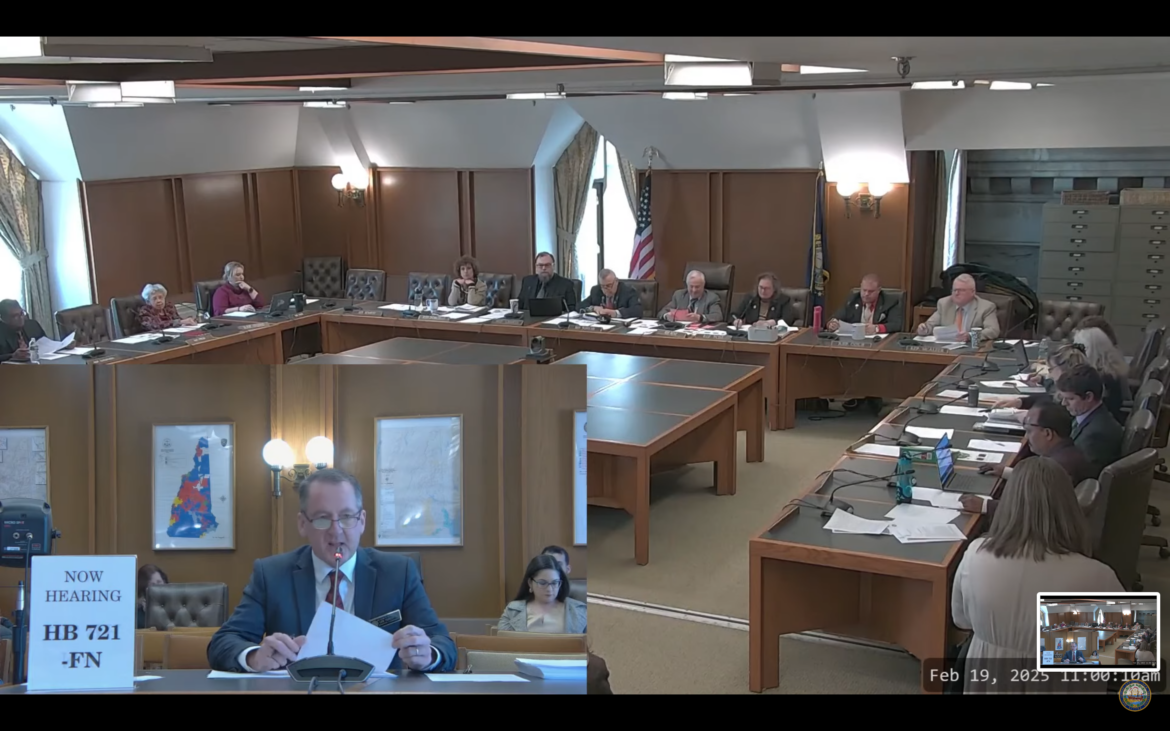By GARRY RAYNO, InDepthNH.org
CONCORD — The state’s paid family and medical leave program is three years old and a group of Republican lawmakers want to repeal it.
A pet project of former Gov. Chris Sununu, the state’s voluntary program currently serves 23,600 state residents, including about 9,000 state employees, but Rep. Len Turcotte, R-Barrington, called the program “a total failure” and a new social entitlement program for public workers.
He urged the House Commerce and Consumer Affairs Committee to repeal the program and save state taxpayers $2 million a year. He charged that the program incentivizes workers not to work.
In 2021, the New Hampshire model was approved and used the then-10,500 state employees as the base for establishing the risk pool so an accurate premium could be determined and sought to entice public and private businesses and organizations to join the pool.
Originally, the program was proposed with a payroll tax on every worker in the state but was initially vetoed by Sununu before he proposed his own voluntary program, first with Vermont and then with only New Hampshire.
Young women are the largest users of the program today, said state officials who support the program and oppose House Bill 517 to repeal it, when they leave work to have a child.
The state program offers six weeks of paid leave at 60 percent of salary in partnership with MetLife, who administers the program.
The state has an individual option for workers whose companies do not offer paid leave, with the premiums capped at $5 a week.
State insurance, employment security and administrative services department officials defended the program saying it is a boost economically and helps attract particularly young workers.
“This program is designed to provide critical support during some of life’s most significant moments,” said Insurance Commissioner DJ Bettencourt, “in many cases unforeseen and in many cases very difficult moments for individuals and families to go through.”
Repealing this program would inject uncertainty into the marketplace now that businesses and consumers rely on this coverage, he said, noting it would also drive up claims for short-term disability and workers’ compensation, and increase those premiums, which will place a greater burden on businesses and families.
Turcotte told the committee the program only serves 2.6 percent of the state’s workers, less than 1 percent from private companies while the state spends $1.9 million annually on state workers and the same amount on advertising and marketing to try to attract new businesses and employees.
Private insurance exists to cover paid leave called short-term disability insurance if people want coverage, he noted, but state officials disagreed with his assertion saying it covers only individual leave not for families.
“It is easier to get someone else to pay for it,” Turcotte said. “Simply remove all taxpayer money and let (state employees) pay for it if they want it.”
The only way to make the program work financially is to force everyone to opt in, he said, and that simply does not work.
Turcotte was the only person speaking in favor of the bill at the hearing, as everyone testifying after him opposed the bill, with one person calling it a “hand up, not a hand out.”
Richard Lavers, Department of Employment Security Deputy Commissioner, said the program’s current enrollment is 23,600 New Hampshire workers, including 9,088 state employees, 13,300 workers with both public and private employers, and 1,400 individuals.
There are 306 private companies in the program, most with 50 employees or less, he said.
He said the most recent open enrollment for individuals in December and January produced more than 1,000 applicants, with an expected enrollment of about 1,800 individuals this year.
Cassie Keane, Department of Administrative Services Deputy Commissioner, said last year the program cost the state $1.3 million, and the state spent $700,000 the first year on advertising and $1.3 million the second year.
Laura Milliken, executive director of NH Hunger Solutions, said her nonprofit organization gladly pays the premiums for its workers as it helps to retain and hire employees.
She noted three employees had utilized the program, two for childbirth and another to take care of a parent with cancer.
“They came back (to work),” she said, and that is absolutely critical to us.”
Nancy Glynn, a Sutton select board member, said her town participates in the program with affordable premiums.
“Thousands of people in New Hampshire stand to lose if this is repealed,” Glynn said. “Let’s not remove something that does good for Granite Staters and for municipalities like mine.”
When Turcotte was testifying, committee member Rep. Merryl Gibbs, D-Concord, asked him why he wanted to make it difficult if not impossible to care for an elderly parent or a sick child.
“My intent is to repeal the program, so taxpayers are not on the hook for state employees at a cost of $2 million.”
The House electronic system to file testimony or weigh in on a bill, indicated 1,908 opposed the bill and 19 were in favor.
The committee did not make an immediate recommendation on the bill.
Garry Rayno may be reached at garry.rayno@yahoo.com.





